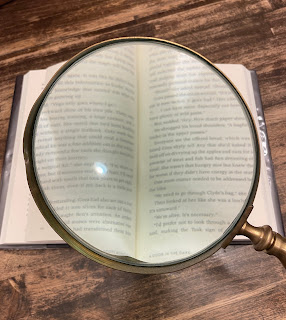So yes. Analyzing genre reader expectations is something I'm interested in understanding. I have a friend who speaks in terms of hitting reader buttons. One of her examples is that somewhere in the first third of a romance, the heroine sees through the hero's BS. She sees who he could have been (and could still be) if only he hadn't been forced to develop callouses and scars on his heart and seeing that dichotomy makes her MAD. Now, I would never have ID'ed that particular point, but thinking it through, I see it. So it got me thinking about what other hot buttons I'm reading right over the top of unseeing.
I know what *I* want to see in a story. I'm not entirely certain I'm the best benchmark, however. Then I got involved in a fandom for a show (a rom com). The fandom skews younger than my typical audience and I do a lot of listening. The fan analysis of the show has been DEEP and I'm soaking it up because I'm getting glimpses into what lights these young people up. One of them made a great observation that they aren't like the generations before them who all want to be comforted and made to feel content and happy. She said, "We don't want any of that. We *want* you to rip out our hearts and squeeze them dry." There were many pile-on comments affirming this, though I won't take it as The Truth for an entire generation - but for this rabid and insanely loyal fan base, I will take it as gospel.
I'm still trying to process it and see if somewhere in my own work I can pull some angst into the mix. My take away: Read. Yes, absolutely. But don't stop there. Seek out stories in every format and look at the beats. What happens where? When? Why? What sticks with you? In my case, having this totally over the top fandom picking apart every scene, every nuance, and every breath the characters take has been an amazing master class in understanding what touched the most people in the biggest way. Spoiler: It was tiny detail in the developing relationship - not the big gestures. The smallest touch at the point of greatest danger ruined the Twitter feed for that fandom for months. Months. That's the kind of genre reader expectation I'm looking for - an expectation readers might not be able to name, yet crave all the same without knowing. Then, if I'm clever, I turn that expectation on its head a bit and leave my readers in puddles on the floor. But no pressure.
Consuming stories is a good start if you're analyzing expectations but I feel like it's possible to consume passively - to just take in and experience. The real power comes from a sense of curiosity around what makes something affect you, how it affects you, and why it affects you. Only then can you parse out the pieces and rearrange them to your own purpose. Finding a group of people who are impacted by the same story you are and who are willing to obsess about it at length with you helps enormously. But it's 100% optional.







